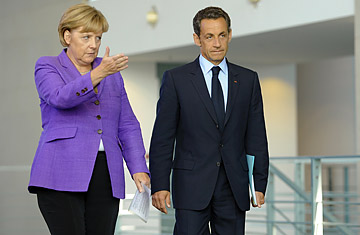
German Chancellor Angela Merkel (left) and French President Nicolas Sarkozy arrive for a joint press conference in Berlin on August 31, 2009.
The sometimes tense personal rapport is a long way from the public shows of affection their predecessors staged, particularly Helmut Kohl and François Mitterrand, who movingly held hands in 1984 in a Verdun cemetery. There's been tension over policy, too. Charles Grant, director of the London-based think tank Centre for European Reform, points out that France and Germany have been at odds on issues from how best to reflate their economies during the economic crisis to the smartest strategies for dealing with Russia.
But influential movers in France are now eager to put the relationship back on a friendlier footing. In a recent paper French think tank Institut Montaigne laid out an ambitious agenda for the two nations, arguing that a new impetus is needed if Europe's voice is to be heard in a world full of big new players, such as Brazil and India, and at a time when President Obama seems far more preoccupied with China and the rest of Asia than with America's traditional allies in Europe. Among other proposals, the think tank recommends that France share its U.N. Security Council seat with Germany, and that the two nations combine their diplomatic missions and staff. It also suggests that the two closely coordinate their budgetary and fiscal policies, merge the Paris and Frankfurt stock markets and issue a joint Eurobond totaling 100 billion euros ($145 billion) to finance long-term industrial and infrastructure projects.
None of this is, as yet, official French policy. But several top political figures close to Sarkozy, who was one of the first world leaders to congratulate Merkel on her re-election, argue that it's time France and Germany seized the reins in Europe again. Assuming Irish voters approve the E.U.'s Lisbon Treaty on Oct. 2, a decade-long debate over the E.U.'s institutions should come to an end later this year, opening the way for a new wave of change. "We've had a decade of institutional masturbation, during which everyone lost their public opinion," one French government minister, speaking privately, says. "It's time to move on and become more political again."
There are signs his counterparts in Berlin agree. Merkel made a point of mentioning Sarkozy in her final campaign appearance on the eve of the election, and there's a growing belief that new joint initiatives could now follow. "There is a desire for a new spring in French-German relations — even if it's autumn," says Claire Demesmay, a France expert at the German Council on Foreign Relations in Berlin. Even the personal aspect of the relationship seems to be improving. In France, Pascale Joannin, general manager of the Robert Schumann Foundation, a think tank, says that while "Merkel is more Francophile than Sarkozy is Germanophile," the pair "have grown used to one another." Joannin expects swift action to coordinate the two nations' positions at the December conference on climate change in Copenhagen, and on fixing the top jobs at the new European Commission. Even before the election, the two nations worked together to push for a crackdown on tax havens and for bankers' bonuses to be curbed.
